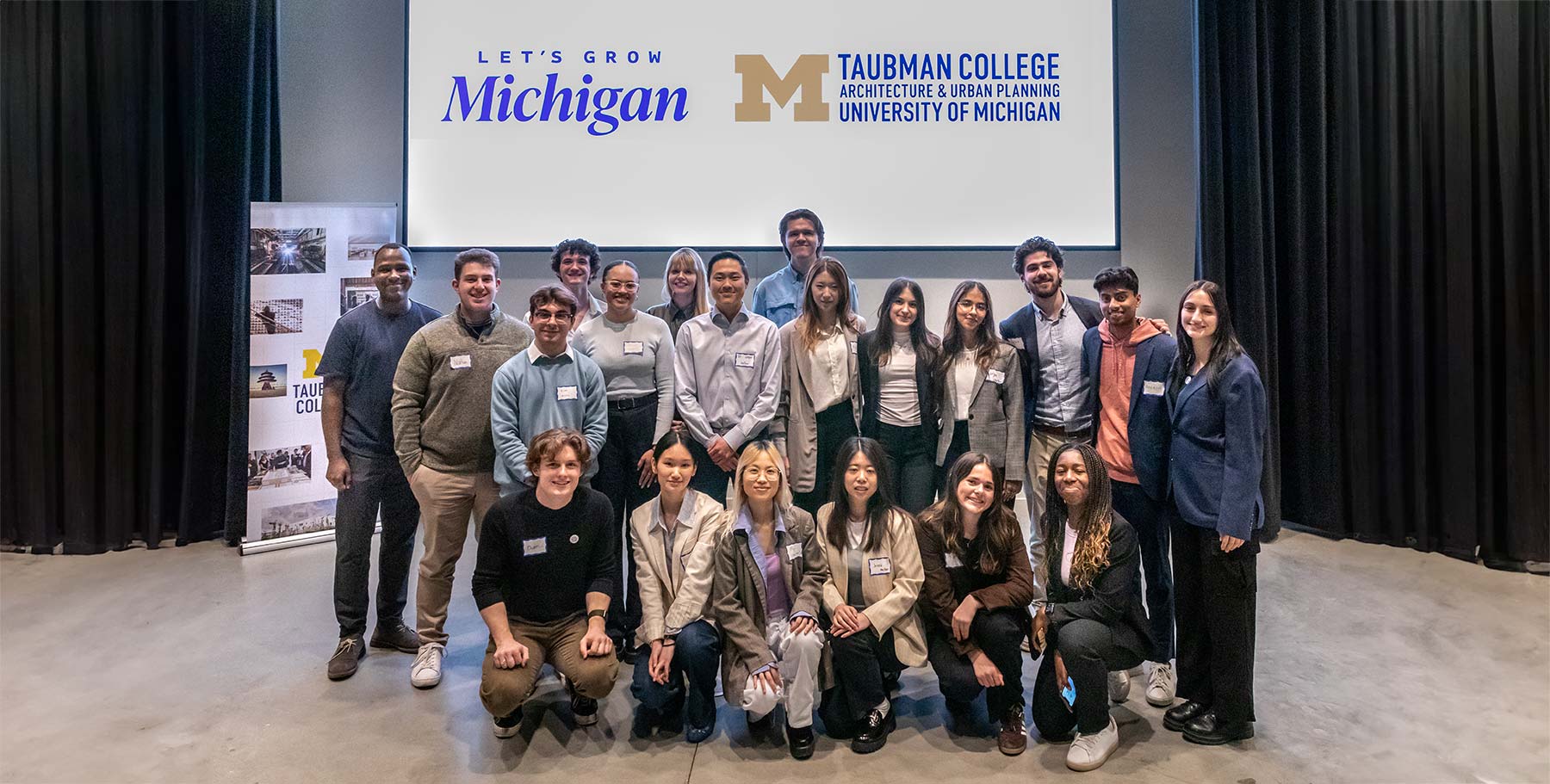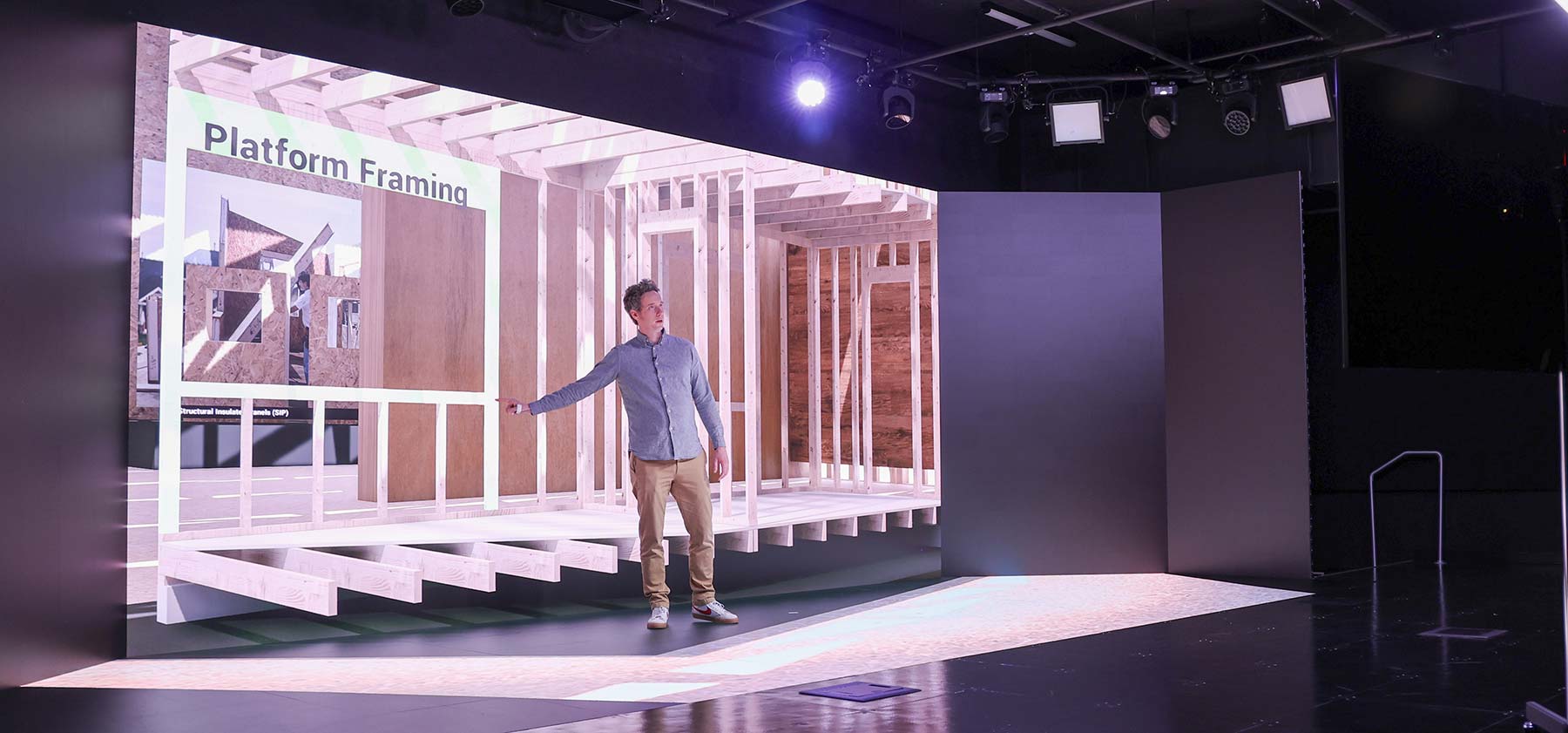Seven proposals for innovative faculty collaborations are receiving funding from a new Taubman College grant program, “Get It Together.” Jointly launched in January 2021 by Geoffrey Thün, senior associate dean for research and creative practice (R+CP), and Anya Sirota, associate dean for academic initiatives, “Get It Together” invited proposals from groups of faculty who share an area of scholarly interest, an enthusiasm for methodology, or academic expertise. The program builds upon R+CP’s ongoing mission to provide resources to sponsor faculty collaborations in the form of labs, clusters, or other provocative, realizable, yet-to-be-determined formats.
Submissions spanned a range of topics, including extended reality, public interest design, computational design, housing, urbanism, and health infrastructure. The proposals were reviewed by an interdisciplinary panel composed of faculty from three external universities.
“After careful consideration, we’re delighted to announce that all seven proposals will be awarded,” Thün and Sirota said. “Each submission was timely, interdisciplinary, categorically distinct and shows promise in both pedagogy and research.”
Thün added, “The Get it Together program is the latest in a series of experimental seed efforts we have undertaken within the college that aim to initiate and stimulate new formats of research and creative practice. Through this program, we anticipate new synergies that will bridge faculty work and student experiences, focusing intensity and conversations over the next year and beyond.”
The inaugural “Get It Together” grant recipients are:
Architectural Computational Design + Construction (ACDCC)
A cohort of 14 faculty members whose research, teaching, and creative practice center on computational design (CD) and digital fabrication (DF) will establish the Architectural Computational Design and Construction Cluster. They will develop a website to foster further collaborative exchanges, build teaching capacities across all the degree programs, and convene regularly to cultivate and enhance communication for matters that arise from everyday activities such as resource sharing to long-term strategic planning to navigate individual and institutional growth — in addition to making a legible, cohesive presence for an external audience of students, researchers, and industry partners. By contributing collectively to this website, they will help shape this group’s prominence as a collective whole and make visible their influential impact within the field of CD+DF.
PI: Tsz Yan Ng
Project Team: Arash Adel, Sean Ahlquist, Matias del Campo, Catherine Griffiths, Wes McGee, Mania Aghaei Meibodi, Mark Meier, Catie Newell, Jonathan Rule, Jose Sanchez, Kathy Velikov, Peter von Bülow, and Glenn Wilcox
BETA MATTER LAB: XR/Material Environments
Responding to an increased interest from students in new, mixed-reality mediums and building on an existing body of faculty work, this lab aims to increase the visibility and legibility of this ongoing work; create ease of access to these technologies; develop experimental curricula, and be a funding platform for faculty and student projects. The lab will operate through both curricular and research domains by creating new collaborative structures across faculty, disciplines, and institutions. The lab proposes to incorporate existing emerging technology into all scales of architectural production while also developing new tools and techniques and pointing XR tools towards sustainable digital/material hybrid practices. Part research initiative, part production design, the lab will also reach new audiences and alliances beyond the discipline by serving as visuospatial designers available for collaborations with external partners/clients on a project-to-project basis.
PI: Laida Aguirre
Project Team: Mark Lindquist, Thom Moran, and Jonathan Rule
Catalyzing a New Urban Research Initiative at Taubman College
This project seeks to establish a research center within the urban and regional planning program that will formalize support for a vibrant research culture and foster educational excellence around planning and urbanism issues. Currently, many planning faculty participate in collaborative research projects elsewhere on campus and thus rely on outside units to host and administer their efforts. This current situation reduces the number of research assistantships available to Taubman master’s and Ph.D. students, fragments the visibility of their important efforts, and reduces the likelihood of involving additional faculty from planning, urban design, and architecture. Particularly with the launch of the Bachelor of Science in Urban Technology degree, it is an exciting time to establish a research center at Taubman College.
Co-PIs: Scott Campbell, Lan Deng, Robert Goodspeed, Lesli Hoey, Larissa Larsen, Jonathan Levine, Martin Murray, and Anthony Vanky
Collective for Equitable Housing
The Collective for Equitable Housing (CfEH) will serve as the first platform for Taubman College and the University of Michigan to study housing holistically, building upon cross-campus relationships and with other institutional, governmental, and organizational partners. This interdisciplinary collective of faculty working on housing and urban communities will make its work legible and accessible through — among other activities — a public-facing platform. CfEH will begin by collating, documenting, and presenting Taubman College’s pedagogical, professional, and research work on this topic, highlighting the college’s existing expertise across architecture, planning, and real estate in innovative housing production, design, and construction; co-living and co-working hybrids; affordable housing and community development financing; institutional and regulatory frameworks; and international housing policy and development. By establishing a base for building richer interdisciplinary teaching and practice engaging external communities and constituencies, the goal is for CfEH to ultimately serve as a think tank that can nimbly identify and address emerging issues and opportunities afforded by new technologies, markets, and urban policies.
PI: Sharon Haar
Project Team: Ellie Abrons, Jacob Comerci, Lan Deng, Meredith Miller, and Marc Norman
Demo or Die Collective
(TLDR: Built Environment + Technology + Speed + Show, don’t tell)
The Demo or Die Collective (DnD) will develop an technology-oriented, entrepreneurial culture across Taubman College through prototyping and deployment, with the goal of supporting and extending existing conversations about design, making, and social and spatial justice through technology experimentation — and exploring work that is equally relevant to architects and planners, operating across scales. Projects must be thoughtful about technology within public spaces and structures, completed in three months or less from first sketch to working code, conducted in the open (e.g. documented online, published open source), and demo’d. Nothing matters unless people can see it working. DnD will contribute to the discourse related to entrepreneurship at Taubman College, as well as connecting work at the college to partners on campus such as the Center for Entrepreneurship and the Zell Lurie Institute.
Co-PIs: Bryan Boyer and Anthony Vanky
Repositioning Architecture, Design, and Health through New Interdisciplinary Partnerships
This project is motivated by the interplay between design-thinking, integrative medicine, and health infrastructure toward more impactful forms of educational programming, interdisciplinary partnerships, and research platforms. Health infrastructure is heterogeneous and disaggregated. Physicians understand health as a human condition to be diagnosed and treated. Architects understand health through environmental and typological frameworks. Disability Studies and Critical Race Theory argues that health is conditioned by systems of oppression. Health is splintered into areas of specialization perpetuating market forces that exacerbate health disparities. The project aims to close disciplinary knowledge gaps in order to foster health equity and accessibility through design-thinking strategies, while leveraging the opportunity space for student career pathways. Methods will include discovering student interest and mapping knowledge networks, coordinating critical conversations with cross-disciplinary faculty and students, reprogramming the college’s health-informed design curriculum, and aligning diverse research agendas.
PIs: Robert Adams and Joy Knoblauch
Co-PIs: Andrew Ibrahim and Upali Nanda
U-M Public Design Corps (UM-PDC)
During the turbulent summer of 2020, Taubman College launched the UM-PDC (Corps) and (1) met the urgent call by students to boost existing levels of engagement of those groups who remain largely absent from the normative activities of the architecture profession; (2) forged alternative models of publicly engaged practice; and (3) piloted the first iteration of the UM-PDC. With 37 student participants, 13 faculty and staff advisors, and six community partner-organizations, the pilot proved a promising beginning. After swiftly implementing a structure and process for the Corps, the first round proved the level of interest, enthusiasm, and benefit that such a program could yield, and also left questions about how to ensure the longstanding sustainability of the program, create curricular integration, and to continue expanding our partnerships. Support for the next phase will address how to face systemic challenges in order to strengthen the Corps’ work in advancing culturally rooted and sociopolitically critical agendas: how to more nimbly bring classroom ingenuity and inventiveness to partnerships with community groups, activists, and public-serving organizations; and how to work within rigid semester structures and processes of academic dissemination.
Co-PIs: Maria Arquero de Alarcón, Jacob Comerci, Mitchell Deans, Emily Ebersol, Irene Hwang, Julia McMorrough, Ana Morcillo Pallares, Gina Reichert, Torri Smith, and Ana Paula Pimentel Walker





